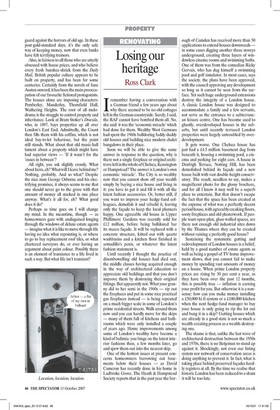Losing our heritage
Ross Clark /remember having a conversation with a German friend a few years ago about why there seemed to be no old cottages left in the German countryside. Surely, I said, the RAF cannot have bombed them all. No, she said: it was the 'economic miracle' which had done for them. Wealthy West Germans had spent the 1960s bulldozing fuddy-duddy old houses and building nice modern chalet bungalows in their place.
Soon we will be able to give the same answer in response to the question, why is there not a single fireplace or original architrave left in the whole of Chelsea, Kensington or Hampstead? The answer is London's own economic 'miracle'. The City is so wealthy now that you cannot show off your wealth simply by buying a nice house and living in it: you have to gut it and fill it with all the latest fashion accessories. Or, better still, if you want to impress your hedge-fund colleagues, demolish it and rebuild it, leaving only the facade to keep the local planners happy. One agreeable old house in Upper Phillimore Gardens was recently sold for £12 million, before being bulldozed bar its stucco facade. It will be replaced with a concrete structure, kitted out with quartz washbasins and a kitchen floor finished in armadillo's penis, or whatever the latest fashion statement is.
Until recently I thought the practice of disembowelling old houses had died out, the middle classes having acquired enough in the way of architectural education to appreciate old buildings and that you don't improve them by destroying their original fittings. But apparently not. What your granny did to her semi in the 1960s — rip out the fireplaces and put in some nice practical gas fireplaces instead — is being repeated on a much bigger scale in some of London's prime residential streets. Walk around them now and you can hardly move for the skips — many of them full of kitchens and bathrooms which were only installed a couple of years ago. Home improvements among some of London's wealthy have become a kind of bulimia: you binge on the latest interior fashions then, a few months later, go and spew them out into the nearest skip.
One of the hottest issues at present concerns homeowners burrowing out basements below their houses — as David Cameron has recently done in his home in Ladbroke Grove. The Heath & Hampstead Society reports that in the past year the borough of Camden has received more than 50 applications to extend houses downwards — in some cases digging another three storeys underground, creating three layers of windowless cinema rooms and swimming baths. One of them was from the comedian Ricky Gervais, who has dug himself a swimming pool and golf simulator. In most cases, says the society, the plans have been approved, with the council approving any development so long as it cannot be seen from the surface. Yet such huge underground extensions destroy the integrity of a London house. A classic London house was designed to accommodate a family and a few servants, not serve as the entrance to a subterranean leisure centre. One has become used to ghastly, overdeveloped houses in the suburbs, but until recently terraced London properties were largely untroubled by overdevelopment.
It gets worse. One Chelsea house has just had a £4.5 million basement dug from beneath it, housing a swimming pool, a cinema and parking for eight cars. A house in Denbigh Terrace, Notting Hill, has been demolished behind its facade and a new house built with vast double-height conservatory. The result, needless to say, makes a magnificent photo for the glossy brochure, and for all I know it may well be a superb place to entertain. But that doesn't escape the fact that the space has been created at the expense of what was a perfectly decent period house, with agreeably creaking floors, sooty fireplaces and old plasterwork. If people want open-plan, glass-walled spaces, are there not enough old industrial sites down by the Thames where they can be created without ruining a perfectly good house?
Sustaining the systematic gutting and redevelopment of London houses is a belief, held by a good number of estate agents as well as being a gospel of TV home improvement shows, that you cannot fail to make money by spending vast amounts of money on a house. When prime London property prices are rising by 30 per cent a year, as they have been over the past 12 months, this is possibly true — inflation is earning your profit for you. But otherwise it is a nonsense: how can you make money installing a £50,000 hi-fi system or a £100,000 kitchen when the next hedge-fund manager to buy your house is only going to rip the lot out and bung it in a skip? Gutting houses which are already in a good state is not so much a wealth-creating process as a wealth-destroying one.
The shame is that, unlike the last wave of architectural destruction between the 1950s and 1970s, there is no Betjeman to stand up against it. Shockingly, not even our listing system nor network of conservation areas is doing anything to prevent it. In fact, what is taking place behind preserved facades hardly registers at all. By the time we realise that historic London has been reduced to a sham it will be too late.







































































 Previous page
Previous page